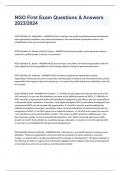NGO First Exam Questions & Answers 2023/2024
NGO Definition (C. Warkentin) - ANSWER-Private, voluntary, non-profit associations whose membership and organizational activities cross national boundaries; Any international organization which is not established by inter-governmental agreement
NGO Definition (S. Ahmed and D.M. Porter) - ANSWER-Cannot be for profit, cannot advocate violence, cannot be a political party, a school, or a university
NGO Definition (C. Beyer) - ANSWER-NGOS are non-state, non-profit, non-violent organizations with the main objective of pursuing political or social change without striving for governmental power
NGO Definition (K. Martens) - ANSWER-NGOS are formal, professional independent societal organizations whose primary aim is to promote common goals of national and international level; private
organization that registers interest in democracy; Can receive financial funding from institutions, but only
to an extent
NGO Definition (UN) - ANSWER-Six Principles - 1.) An NGO should support the aims and the work of the UN. However, it is very rare that objections are made to the political purposes of NGOs, 2.) Officially, an NGO should be a representative body with identifiable headquarters, and officers who are responsible to
a democratic-policy conference. In practice, many highly prestigious NGOs, particularly development and
environment NGOS are not membership organizations, 3.) An NGO cannot be a profit-making body. Individual companies cannot gain consultative status, but trade federations of commercial interests are recognized as NGOS, 4.) An NGO cannot use or advocate violence, 5.) An NGO must respect the norm of "non-interference in the internal affairs of state". This means an NGO cannot be a political party---but, like companies, parties can form international federations. Also, NGOs concerned with human rights should not restrict their activities to a particular group, nationality, or country, 6.) An international NGO is one that is not established by intergovernmental agreement
NGO Definition (Lewis and Kanji) - ANSWER-Broad - third sector or non-profit research; Common-sense definition: "NGOs are organizations concerned with the promotion of social, political or economic change---an agenda that is usually associated with the concept of "development". This gives emphasis to
the idea that an NGO is an agency that is primarily engaged in work relating to the areas of development or humanitarian work at local, national, and international levels." Three Main Roles for NGOs (Lewis and Kanji) - ANSWER-1.) Implementers, 2.) Catalysts, 3.) Partners - Of course a particular NGO is rarely confined to a single role, and many organizations engage in all three types of activities at once. An NGO may, as Korten's model below suggests, shift its emphasis from one to the other over time, as contexts and opportunities change.
Implementers - ANSWER--Concerned with the mobilization of resources to provide goods and services to
people who need them
-The service delivery role embodies a wide range of activities carried out by NGOs in fields as diverse as healthcare, microfinance, agricultural extension, emergency relief and human rights
-Service delivery work has increased, due to being increasingly "contracted" by governments and donors within the last two decades of governance reform and privatization to carry out specific tasks in return for payment
-More prominent now as increasing emphasis is given to the role of NGOs responding to man-made emergencies or natural disasters within the framework of humanitarian action
Catalysts - ANSWER--Normally understood as a person or thing which brings about change
-The catalyst role can therefore be defined as an NGO's ability to inspire, facilitate or contribute to improved thinking and action to promote change
-This may be directed towards individuals/groups in local communities, or among other actors in development such as government, business, or donors
-May include grassroots organizing, group formation, gender and empowerment work, lobbying and advocacy work, undertaking and disseminating research, and attempts to influence wider policy processes through innovation and policy entrepreneurship
Partners - ANSWER--Works together with another and shares the risk or benefit from a joint venture
-The role of partner reflects the growing trend for NGOs to work with government, donors, and the private sector on joint activities, such as providing specific inputs within a broader multi-agency programme or project
-Also includes activities that take place among NGOs and with communities such as "capacity-building" work which seeks to develop and strengthen capabilities -The commonly used policy rhetoric of "partnership" poses an important challenge for NGOs to build mutually beneficial relationships that are effective, responsive and non-dependent




